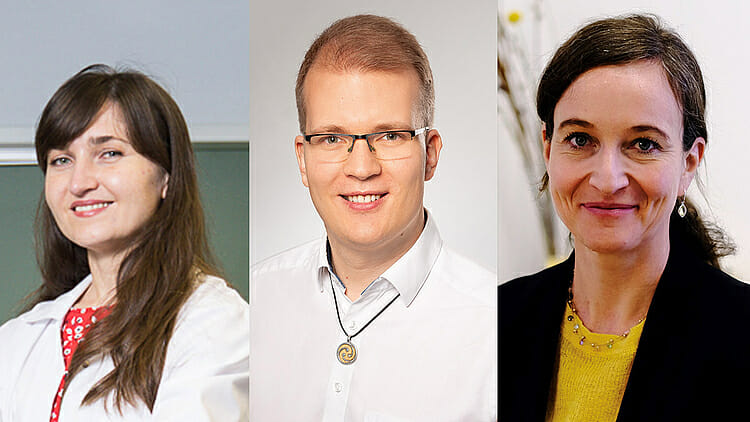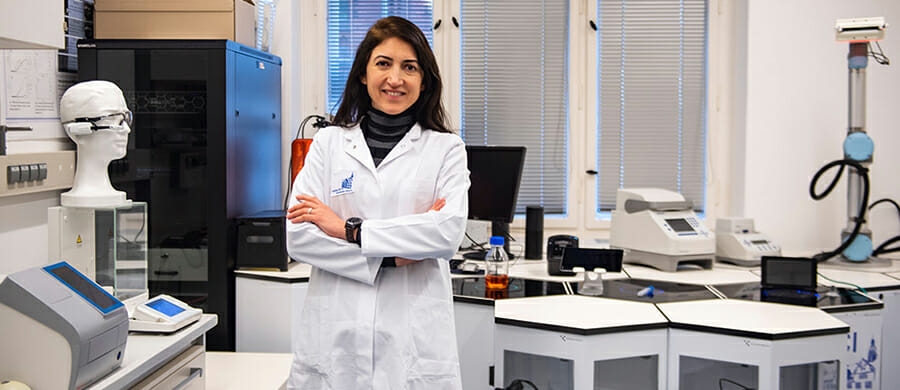Leibniz University Hannover
Prof. Dr. Natalia Tschowri: Institute for Microbiology
Prof. Dr. Marius Lindauer: Institute for Information Processing
Ass. Prof. Dr. Catherine Herfeld: currently University of Zurich, located at LUH at the Institute of Philosophy
DATA & FACTS
Projects
LUH scholars awarded prestigious ERC grants for innovative research: Three new ERC Starting Grants in 2021 (60 months each)
Scientific contact
Prof. Dr. Natalia Tschowri, Prof. Dr. Marius Lindauer, Prof. Dr. Catherine Herfeld
EU-Funding line
Horizon Europe: ERC
Projektleitung: Prof. Dr.-Ing. Arno Kwade
Projektname: „Li-Ion Pilot Lines Network“ (LiPLANET)
Keywords: Energie, Mobilität, Partner
LUH scholars awarded prestigious ERC grants for innovative research: Three new ERC Starting Grants in 2021
Three researchers at Leibniz University Hannover awarded highly competitive EU grants for ground-breaking projects

Pioneer projects on signal molecules, artificial intelligence and philosophy of science: three researchers at Leibniz University Hannover (LUH) have received internationally coveted ERC Starting Grants in the 2021 round of calls. The European Research Council awards Starting Grants of up to 1.5 million euros to outstanding early-career researchers for excellent and visionary project ideas. The aim is to foster scientific independence by enabling them to establish their own research group over a period of up to five years. Researchers with two to seven years of experience since completion of their doctoral degree are eligible to apply.
The following LUH researchers were awarded funding under the 2021 Call: Prof. Dr. Natalia Tschowri (Institute of Microbiology), Prof. Dr. Marius Lindauer (Institute of Information Processing), Prof. Dr. Catherine Herfeld (currently University of Zurich; ERC grant to be based at the Institute of Philosophy, LUH).
“Three Starting Grants is an excellent outcome. I would like to congratulate the award winners on this achievement”, says Björn Thümler, Minister of Science and Culture of Lower Saxony. “The fact that a total of seven grants were secured by researchers in Lower Saxony shows that the strong European focus in our research policy has set us on the right path for the future. We will continue to support researchers based in Lower Saxony in acquiring EU funding.”
Signal molecule research: Interactions between living cells and their environment
Within the scope of the project SecMessFunctions, Prof. Dr. Natalia Tschowri will focus on the function and regulation of novel second messengers. “They are important signal generators in the interaction of all living cells with their environment, yet we still know very little about the way they work”, says Professor Tschowri. Using streptomyces bacteria that produce antibiotics as a model, the project will investigate how these signal molecules control complex cellular differentiations during the transition from unicellularity to multicellularity, as well as modifications of the cell wall in bacteria. In collaboration with Prof. Dr. Russell Cox from the Centre of Biomolecular Drug Research (BMWZ) of LUH, Professor Tschowri intends to determine whether the synthesis of biologically active natural substances can be optimised via these messengers. “Overall, SecMessFunctions will not only result in the discovery of fundamentally new signal transmission principles, but also identify new goals for drug design as well as tools for modelling the biosynthesis of antibiotics”, explains Professor Tschowri, who has held a professorship in cellular microbiology at LUH since 2020.
AI development: a human-centred approach
The development of modern artificial intelligence (AI) applications is gaining in momentum and via automated machine learning technology (AutoML) can be made accessible for non-specialists. “However, this evolution largely fails to take account of the role of humans as experts, both with regard to the technology and its application”, says Prof. Dr Marius Lindauer. “ixAutoML” therefore aims to place human users front and centre in AI technology development. In this context, both the expertise and the preferences of AI application developers are taken into account. Moreover, new insights with regard to AI development are shared with them. “This allows the experience of human beings and machines to complement each other in the best possible way in order to find efficient solutions to multifaceted problems”, says Professor Lindauer, who has held a professorship in machine learning at LUH since 2019.
Questions relating to philosophy of science: Overcoming boundaries between disciplines
In her project “Model Transfer”, Prof. Dr. Catherine Herfeld focuses on the question whether and under which conditions scientific models can be used across disciplines in order to produce findings on fundamentally different phenomena. “The fact that the well-known Lotka-Volterra model not only illustrates predator-prey relationships in biology, but is also used to explain business cycles in economics, as well as the growth of cancer cells in medicine reveals new perspectives on the nature and function of scientific models”, says Herfeld. Furthermore, the project addresses questions relating to philosophy of science and the relationship between scientific modelling and progress in science. It combines quantitative empirical methods of social sciences and traditional approaches from the disciplines history of science and philosophy of science in order to examine examples of model transfer empirically, systematically and conceptually. Catherine Herfeld has been an assistant professor at University of Zurich since 2017 and will now use the ERC Grant to establish a research group at LUH.
Due to the tough selection process, ERC Grants are considered the highest accolade awarded by the European Research Council. Key selection criteria include visionary research topics as well as an excellent scientific track record.
Date:
10.01.2022
this might also interest you …

Project: decades
The chemical industry is currently facing the challenging transformation of replacing classic, chemical manufacturing processes based on petroleum with sustainable, bio-based products, in line with the concept of a circular bioeconomy. Solvents, in particular, play a crucial role in the chemical industry along the entire production chain.

Project: Selina
Utilise biodiversity resources in a manner that preserves them and allows previously damaged ecosystems to regenerate: that is the aim of the European project SELINA, which will be coordinated by Leibniz University Hannover (LUH) commencing 1 July 2022. The European Union (EU) awarded the project 13 million euros…
